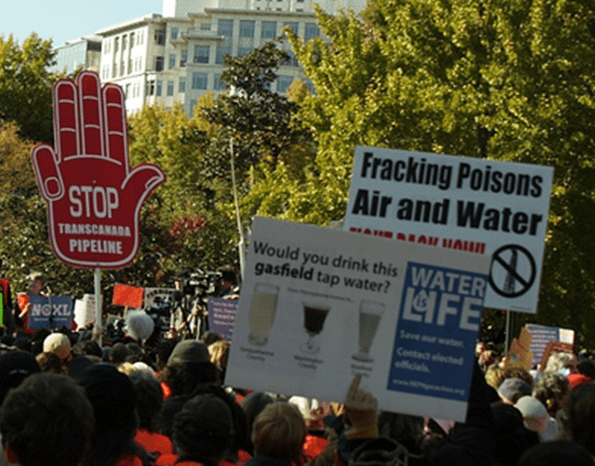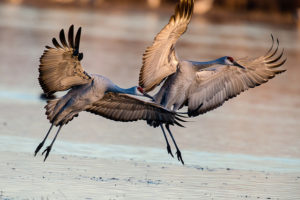We have much more to do and your continued support is needed now more than ever.
Senate Says “No” to Keystone XL; Next up, President Obama

Currently, the pipeline does not have a route in Nebraska because a Nebraska court ruled that landowner’s rights were impeded in the route’s approval. The State Department has indicated that they are putting any decision on pause while an appeal of that decision to the Nebraska Supreme Court occurs. The concerns regarding impacts to landowners, water, land, and wildlife resources in Nebraska are serious, and demonstrate how the risks of Keystone XL are too high. But the other impacts associated with the pipeline already show that it needs to be rejected. NWF urges the President to deny the Keystone XL application and protect our wildlife and our climate.
The Keystone XL pipeline would carry up to 830,000 barrels per day of tar sands oil – one of the dirtiest, costliest, and most destructive fuels in existence – to the Gulf Coast to likely be exported. President Obama has even noted this himself while in Burma last month: “Understand what this project is. It is providing the ability of Canada to pump their oil, send it through our land, down to the Gulf, where it will be sold everywhere else.”
The President has it right; this pipeline is all risk and no reward. The approval of the pipeline would drive massive expansion of climate-disrupting tar sands mining in Canada, which involves digging up tens of thousands of acres of pristine forest in Alberta to extract a fuel that emits more carbon dioxide than conventional oil. The pipeline would have few proven benefits for our economy and poor impacts for our health. Additionally, transporting this dirty fuel through the U.S. has proven to be extremely dangerous and unpredictable. Previous spills in Arkansas and Michigan were disastrous.
KXL Would Be Bad for Wildlife

- Canada lynx who depend on the survival of the boreal forest are being pushed out of their habitat by tar sands development.
- Alberta is one of the last homes of woodland caribou, but booming tar sands development, among other industrial dangers, is destroying their habitat and will likely drive regional populations to extinction unless it is curbed.
- Migratory birds are some of the most negatively impacted by tar sands development. Over 130 species of songbirds and waterfowl which migrate annually between the U.S. and Canada are directly at risk, as tar sands oil extraction threatens to pollute and destroy important summer breeding habitat.
- Tar sands operations create toxic dumps filled with excess chemicals and oil called “tailings ponds“. Thousands of birds, including lesser scaup, have perished due to these seemingly safe sludge pits.
- The danger of a spill in the Nebraska Sandhills region, which is bisected by the proposed Keystone XL route, puts Sandhill cranes at risk at critical points on their migratory paths.
- Tar sands extraction requires a lot of water — up to three barrels of water for every barrel of oil — which can disrupt the normal cycles of nearby rivers and watersheds, endangering a variety of local fish populations.
- The pipeline and its associated development would also be harmful for whooping cranes, wolves, swift foxes and black-footed ferrets in the U.S.

Disrupting the Climate
In addition to all of these issues, perhaps the biggest threat to all of these species is that of climate change. Tar sands are at least 17% more carbon intensive on a life-cycle basis than regular oil, almost ensuring that their development would increase our contribution to a changing climate. Climate change further threatens species like migratory birds and moose though droughts, shifts in vegetation, and the increase of insects like ticks. If expansion of tar sands goes unchecked, it will be impossible to reach our goals to reduce carbon pollution, seriously harming both people and wildlife.
The State Department’s primary conclusions from their January 2014 study, which found that construction of the Keystone XL pipeline would be “unlikely” to alter greenhouse gas emissions, were based on a scenario that didn’t happen. Instead, oil prices have fallen dramatically and rail use has proven not to be a viable alternative. The State Department itself has said that a scenario like that would certainly impact climate – and that scenario is now a reality. So far, without the pipeline, at least three major tar sands extraction projects have been indefinitely delayed, saving, at least for now, precious habitat from destruction and keeping carbon pollution at bay.
Approval of Keystone XL would undermine the recent momentum on climate that President Obama has put into action including reduced emissions from cars and trucks, the Clean Power Plan, and an international climate deal with China. Approving a carbon intensive tar sand pipeline after declaring that the U.S. will cut carbon by 26 – 28% by 2025 just doesn’t work.
While on the Colbert Report last week the President stated: “We’ve got to measure [the pipeline’s benefit] against whether or not it’s going to contribute to an overall warming of the planet — which could be disastrous.” It is now clear that the costs and the carbon pollution far outweigh the benefits of this pipeline and it should be denied. President Obama has the information he needs to take a stand in protecting our wildlife, landscapes, and communities from the Keystone XL pipeline and embrace his global leadership position in fighting climate change.
 Help protect the wildlife at risk from KXL by sending a message urging President Obama to say “no” to the pipeline!
Help protect the wildlife at risk from KXL by sending a message urging President Obama to say “no” to the pipeline!





















